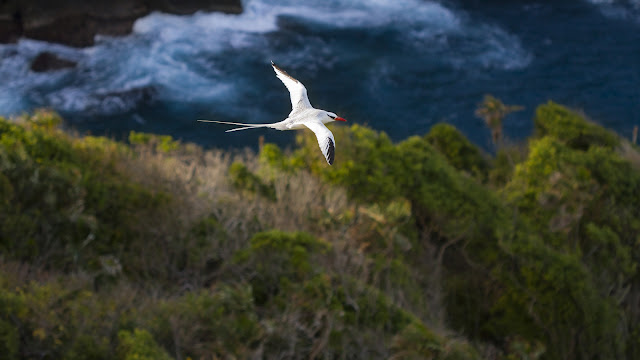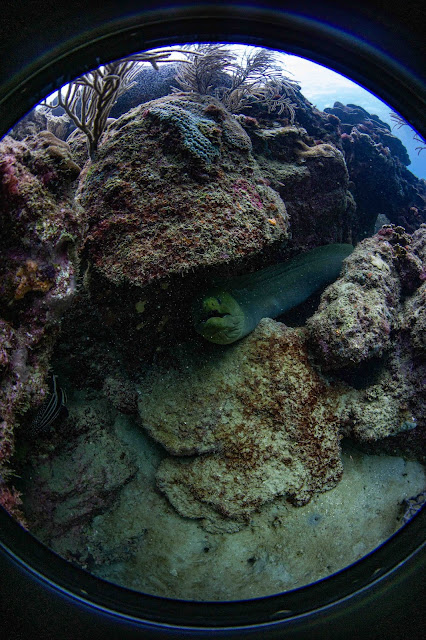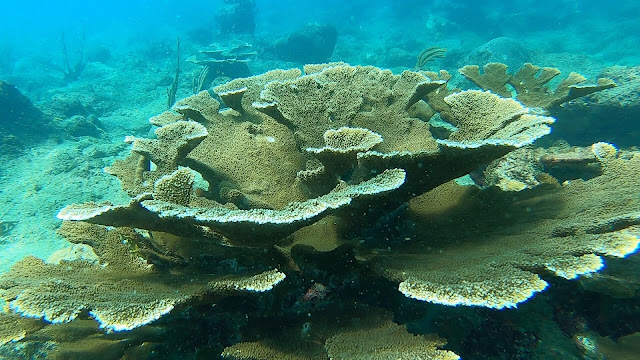Tobago's Perfect Catch
In Tobago, it’s easy to live off the sea,
and you are encouraged to eat fresh fish every way you can. Here are a few thoughts
about finding fresh fish, and some recipes. First published in Newsday Tobago, February 28, 2019
(All photos courtesy Pat Ganase)
In
the best fishing villages in Tobago – Buccoo, Castara and Charlotteville – you
can hear when the boats come in. Reach the jetty or depot with your basin or
pot, and select your fish. Within minutes, skillful fishermen or their helpers
will scale, gut, slice or fillet your choice. Then you are on your way to
prepare – with simple ingredients – the most delicious fish you will ever eat.
Most Tobagonians already know their way around the fishermen, fishing depots,
and fish, so these pointers might be more useful for visitors.
Talk
to the fishermen. This is not easy to do when they have just hauled their boat
in, or are moving containers filled with fish to shore. What was their catch?
Where did they go? Over time, you’ll learn what fish are running now; how much
further they may have had to go; and seasonal changes. You will also certainly
come to know some of the different fish they are catching. You also become
familiar to the fishermen who will be more inclined to chat with you.
When
the wahoo and kingfish are running off the north of Tobago, the open pirogues may
return to Charlotteville with six or more three- to six-foot long slender
wahoo. Wahoo and kingfish are both pelagic (open sea) species migrating through
tropical and sub-tropical waters. Wahoo is a popular sport fish; they are
speedy and give a good pull to test the skill and strength of the fisherman.
For an inducement, you could encourage a Charlotteville fisherman to take you
out with him; be well-protected against the sun (hat, sunscreen, long-sleeved
shirt) and make sure you have your sea legs for choppy waters!
 |
| Use Tobago made coconut oil for frying. |
In a
Castara fisherman’s haul is where I have seen the most mahi mahi or dorado;
also called dolphin though these are not related to the air-breathing sea
mammals. This is also a pelagic species moving in tropical and sub-tropical
waters; it is thought that warming waters may drive them further north. Mahi
mahi is one of the fastest growing fish; so as long as they are caught
sustainably, stocks are likely to regenerate. We all have to be conscious of
what we are eating in order to ensure that we do not waste the Ocean’s supply.
If
you cannot get to Castara or Charlotteville, go to Mt Irvine Fish Depot. Fish
is delivered here regularly by an enterprising distributor who moves around the
island picking up the day’s fresh catch. The assortment may be surprising, and
could include plumhead red fish, white cavali.
What not to buy or eat?
Do not ever be induced by parrotfish. The
survival of parrotfish is crucial to healthy coral reefs; they should never be
eaten, and ought to be conserved in any marine areas where parrotfish
populations may slowly be coming back. Groupers are also needed for healthy
reefs; these are very slow growing fish, and a sizeable grouper is likely to
have ingested toxic materials (to humans) as it feeds along the rocky sea
bottom. At no time or place should you ever purchase or eat shark.
 |
| Look for fish with bright eyes and red gills |
Looking for a new delicacy?
Wherever
you may find it sold or served, lionfish should be eaten. This is an invasive
species that matures and reproduces so quickly that if controls (hunting and
eating) are not put into place, it will soon wipe out native species on
Tobago’s coral reefs. It is also a wily prey and can only be caught by spear,
one by one; they also have barbs that must be carefully removed in cleaning. Check
the dive shops for fresh caught supplies.
 |
| Knife skills distinguish the fishermen who will clean, slice or fillet your fish in two twos! |
Cooking fish: less is better!
So
you have a fresh mahi mahi or wahoo, or piece of a kingfish? You may choose to
have it filleted (no bones) or sliced (bone in). If you are paying for a whole
fish, ask for the head and tail (and skin and bones) in a separate bag. If
there is roe (fish eggs) you may ask for that too.
Fresh
fish is easier to cook than you imagine. It requires fewer ingredients than you
believe; and will cook in less time than you think.
 |
| Ready for steaming |
STEAMED WHOLE FISH
Small fish, 1-2lb each
Onion, two chopped
Garlic, 4-6 cloves chopped
Ginger, thumb-sized chopped
Salt to taste
Hot pepper, piece with seeds removed , finely chopped
Coconut oil, half cup
Heat oven to 350 degrees. Sprinkle salt over fish in an oven-proof dish. Add a little water. Cover tightly with foil. Bake in the oven for about 20 minutes. You should just start to smell the cooked fish. It's tricky to know when the fish is done but not overcooked - best to start with fish that has not been frozen, or if frozen has thawed to room temperature.
While the fish are baking, heat the seasonings - onion, garlic, ginger, hot pepper - in with the oil until fragrant, (stovetop or microwave) about two minutes.
To serve, remove the foil and pour the hot seasoned oil over the fish. Serve immediately.
Small fish, 1-2lb each
Onion, two chopped
Garlic, 4-6 cloves chopped
Ginger, thumb-sized chopped
Salt to taste
Hot pepper, piece with seeds removed , finely chopped
Coconut oil, half cup
Heat oven to 350 degrees. Sprinkle salt over fish in an oven-proof dish. Add a little water. Cover tightly with foil. Bake in the oven for about 20 minutes. You should just start to smell the cooked fish. It's tricky to know when the fish is done but not overcooked - best to start with fish that has not been frozen, or if frozen has thawed to room temperature.
While the fish are baking, heat the seasonings - onion, garlic, ginger, hot pepper - in with the oil until fragrant, (stovetop or microwave) about two minutes.
To serve, remove the foil and pour the hot seasoned oil over the fish. Serve immediately.
FRIED FISH FILLETS
Wahoo slices, filleted
Flour, one cup
Salt, half teaspoon
Coconut oil, three-quarter cup (or enough for frying)
Sauce for fried fish:
Onion, sliced
Garlic, 2 or 3 cloves crushed and chopped
Tomato, 2 or 3 sliced or chopped
Hot pepper, small piece
Pimentos, 3 or 4 chopped
Ginger, small piece chopped
Ketchup, 3 or 4 tablespoons
Heat coconut oil in an iron pot while dredging slices of wahoo with salt and flour.
Over medium to low heat, fry slices of flour-coated fish in the oil until brown on both sides. Drain on absorbent paper or a brown paper bag. When all slices have been cooked, put the onion, garlic, pepper, tomato, ginger into the oil and saute until tender. Add ketchup and simmer until well combined. Serve the fish with the sauce over it.
Wahoo slices, filleted
Flour, one cup
Salt, half teaspoon
Coconut oil, three-quarter cup (or enough for frying)
Sauce for fried fish:
Onion, sliced
Garlic, 2 or 3 cloves crushed and chopped
Tomato, 2 or 3 sliced or chopped
Hot pepper, small piece
Pimentos, 3 or 4 chopped
Ginger, small piece chopped
Ketchup, 3 or 4 tablespoons
Heat coconut oil in an iron pot while dredging slices of wahoo with salt and flour.
Over medium to low heat, fry slices of flour-coated fish in the oil until brown on both sides. Drain on absorbent paper or a brown paper bag. When all slices have been cooked, put the onion, garlic, pepper, tomato, ginger into the oil and saute until tender. Add ketchup and simmer until well combined. Serve the fish with the sauce over it.
FISH BROTH
Fish head and tail, cut up (bones and
skin too)
Carrot, diced
Pumpkin, diced
Potato, diced
Ginger, finely chopped
Garlic, finely chopped
Onion, small, finely chopped
Tomato, chopped
Pimentos, three or four
Olive oil, two to three tablespoons
Salt to taste
Thyme, sprig
Juice of two or three limes
Hot pepper
In deep pot, heat olive oil at medium heat, add onion, ginger, pimento, garlic and tomato. Saute until onions are translucent. Add carrot, pumpkin, potato. Continue to saute, stirring so that the vegetables do not stick or burn. Add three or four cups of water and heat until gently bubbling. Add fish to soup and add more water until the fish is just covered. Add salt to taste and sprigs of thyme. Squeeze juice of limes over all. Put hot pepper on top. Simmer until fish is cooked and flavours are blended, about five to ten more minutes.
(If you are adding green fig or plantain or dasheen, boil these before adding to the soup. If you have ochroes, these may be added with the fish.)
Carrot, diced
Pumpkin, diced
Potato, diced
Ginger, finely chopped
Garlic, finely chopped
Onion, small, finely chopped
Tomato, chopped
Pimentos, three or four
Olive oil, two to three tablespoons
Salt to taste
Thyme, sprig
Juice of two or three limes
Hot pepper
In deep pot, heat olive oil at medium heat, add onion, ginger, pimento, garlic and tomato. Saute until onions are translucent. Add carrot, pumpkin, potato. Continue to saute, stirring so that the vegetables do not stick or burn. Add three or four cups of water and heat until gently bubbling. Add fish to soup and add more water until the fish is just covered. Add salt to taste and sprigs of thyme. Squeeze juice of limes over all. Put hot pepper on top. Simmer until fish is cooked and flavours are blended, about five to ten more minutes.
(If you are adding green fig or plantain or dasheen, boil these before adding to the soup. If you have ochroes, these may be added with the fish.)
 |
| Floured and fried fish roe with a splash of pepper sauce on the side |




